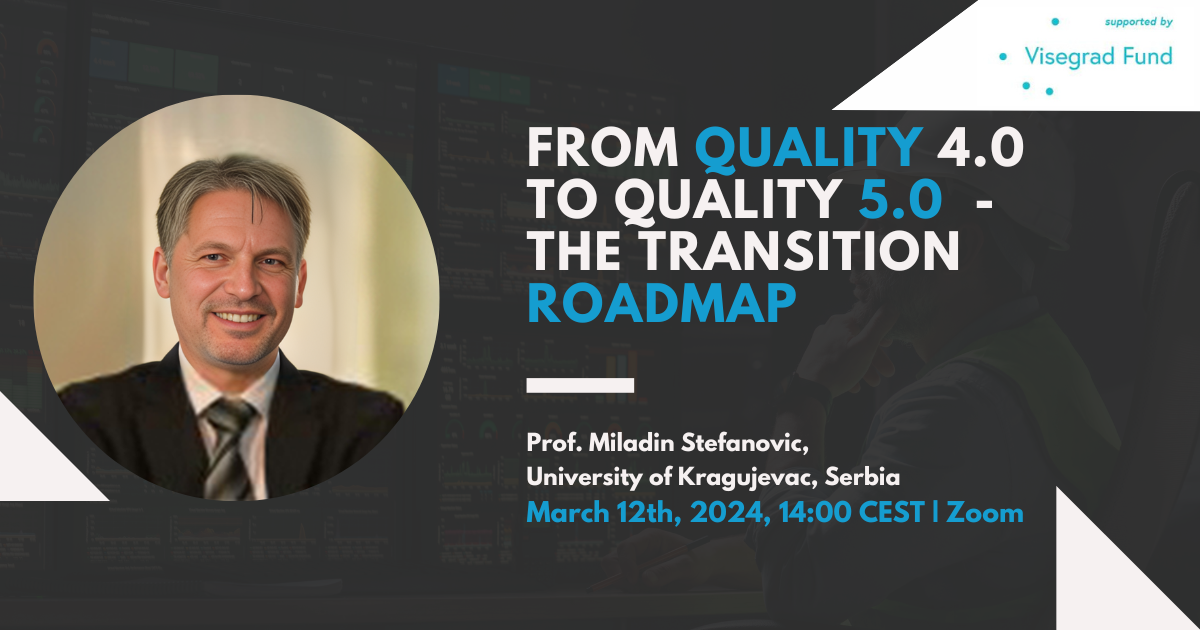
See the recording! Digitalization and new technologies are rapidly spreading throughout the world, specifically in business, industrial, and societal infrastructures. This digital transformation reached every corner of the World, having slightly different names, but profoundly changing all aspects of business and living becoming a pillar of industrial policy, known in Europe as “Industry 4.0,” in China as “made in China 2025,” in Asia as “Smart Cities,” and in North America as “Industrial Internet” and spreading in many different branches such as Quality 4.0, Maintenance 4.0, Safety 4.0, Cybersecurity 4.0, Cybersecurity 4.0, and more.
Today we are facing that present of Quality and Quality Management is in implementation of digital technology following the road map of Industry 4.0. Right now we have concepts Quality 4.0 and QMS 4.0. It is clear that some of the basic principles of quality management are dramatically improved using new technologies such as AI, big data and analytics that could improve evidence based decision making or usage of the cloud technologies for storing data could improve quality control and management as well as horizontal and vertical system integration.
What are the biggest challenges in implementation of the Industry 4.0 or underlying concepts? Industry and Academia have similar answers: Standardization and Reference Architecture, Managing Complex Systems, Delivering a Comprehensive Broadband Infrastructure, Safety and Security, Work Organization and Design, Training and Continuing Professional Development (CPD), Regulatory Framework and Resource Productivity and Efficiency.
It could be concluded that Industry 4.0 is a philosophical transformation of the society and Quality 4.0 proposes the adoption of advanced ICT to enhance quality efficiency and competency. Right now two the biggest challenges are: Understanding and knowledge.
The World is more and more dynamic and things are nowadays rapidly changing. The only permanent situation over time is changes, and we are facing the new one. The transition from Industry 4.0 to Industry 5.0 is practically a transformation from digital manufacturing to a digital society with the convergence of science and technologies in Society 5.0, moving from technology to society. The concept of Quality 5.0 is embedded in concept with following fundamental goals: Leave no Person Behind; Empower Users through Good Digital Identities; Make Business Work for People; Keep Everyone Safe and Secure; Build new rules for a new game, and Broke through the data barrier. The transition from Quality 4.0 to Quality 5.0 involves a significant shift in focus and approach. These are key changes that are required: Human-Centric Focus, Societal Value, Sustainability, Collaboration with Advanced Technology, Broadened Scope. In the other words Quality 5.0 concept in Society 5.0 is directly related with sustainability, sustainable digital innovation, digital culture, social innovations, and quality of life.
In this moment we need to clearly understand the present situation, and to have lessons learned from implementation, success and drawbacks of implementation of Quality 4.0. In the second step we should discuss vision, mission, trends and challenges in transition to Quality 5.0. In the third step we need models of development, implementation and integration of Quality 5.0 covering important variables such as strategy of development, strategy of digitalization, level of investment, level of business excellence, competitiveness level and knowledge level. We have ongoing change and in this one the people that work as professionals of quality management, must be seen as an important part of the change.
Prof. Miladin Stefanovic is an author or coauthor in more than 250 papers and 6 technical solutions, one patent and 11 books and chapters (7 in English) 4 in the field of quality, ICT, and education (author of more than 50 manuscripts published in Journals listed in SCI Thompson - Clarivate).
Participant and project manager in a large number of projects in the field of quality, ICT, e-learning, University - Enterprises cooperation, Curricula development, student internships as well as innovation and technology transfer (7 TEMPUS , 2 ERASMUS +, 5 National Scientific projects). Author, project coordinator/manager or participant on more than 25 software development projects. Participant in projects of development of the Business Start Up center, Kragujevac (University representative). Participant in a large number of scientific projects or projects with industry.
Manager of the Center for Quality, University of Kragujevac as well as the Center for Knowledge Transfer, University of Kragujevac.
Member of IFIP International Federation for Information Processing – Technical Committee – TC3 Education. Member of the Editorial Board in 5 International Journals. Executive Editor of International Journal for Quality Research. Vice president of the International Association for Quality and Quality of Life Research.
